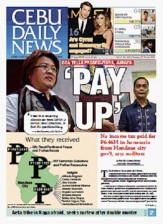The taxman has come for them.
Auditors discovered that judges, prosecutors and court employees in Mandaue City receive honoraria from the local government without deduction for income tax.
The same practice may be happening in other courts in Cebu province.
A total of P6.5 million in allowances was received tax-free by these national government employees from the Mandaue city government from 2009 to 2011, said the Commission on Audit (COA) in its annual post-audit report ending Dec. 31, 2011.
The state auditor urged Mandaue Mayor Jonas Cortes to get a refund from these personnel for the unpaid income tax portion and to “correctly withhold taxes on compensation” paid by the city.
Either the mayor pushes for the refund and “correctly withholds taxes,” or he will be held liable for violating COA rules, said the auditor.
“The non-imposition of taxes on the honoraria or incentive pay deprived the government from using the resources that could have been derived from the taxes to finance projects for the benefit of the general public,” said state auditor Cymbeline Celia Chiong-Uy in her Feb. 24 letter to Mayor Cortes that was received this month.
She said the practice “violates the principle of the uniformity of taxation and the equal protection of the law.”
The COA action has wide repercussions on court personnel in other parts of Cebu and opens up a debate on whether the local allowances should be tax-free.
Monthly allowances are paid by the Provincial Capitol and Cebu city government to assist judges, prosecutors and clerks of court assigned in their areas.
The COA recommended for the refund of income taxes not withheld on previous compensation released to 16 prosecutors, nine judges, and 12 court personnels.
Otherwise, the persons who allowed the payment shall be held liable.
Under Revenue Memorandum Order NO. 8-2003, the mayor, city treasurer and city accountant are “personally charged” with the duty to correctly withhold taxes on compensation paid out to taxpayers.
For provinces, the governor, provincial treasurer and provincial accountant have this duty.
Prosecutors are sure to object.
Regional State Prosecutor Fernando Gubalane, in a phone interview, said allowances from LGUs should be tax-free as stated under Republic Act 10071 or the National Prosecution Services Act.
“A COA memorandum won’t prevail over Republic Act 10071. Even if there would be numerous memoranda from COA, we should take into consideration what is provided under the law,” Gubalane told Cebu Daily News.
COA auditors also suspended the monthly stipend of Gubalane and five Assistant Regional Prosecutors (ARP) who received P10,000 from the Mandaue city government.
In its Notice of Suspenion, COA said they have not received any document showing that officials and staff of the Office of the State Prosecutor were assigned to or stationed in Mandaue City.
This is part of the auditor’s check of multiple allowances being received by prosecutors.
Under the Local Government Code, the city government can “provide for additional allowances and other benefits to judges, prosecutors, public elementary and high school teachers and other national government officials stationed in or assigned to the city.”
A total of P1.1 million was suspended in audit due to lack of papers showing a Mandaue assignment.
Gubalane said they will talk things over to address the issue.
“I still have to read the order. We have to study that,” Gubalane told CDN.
“Granting of allowances from LGUs is stated in the law. As long as the allowances we receive would not exceed 50 percent of our basic salaries,” he said.
Gubalane is receiving a monthly stipend of at least P34,000 from four LGUs in Cebu.
Other than Gubalane, the Mandaue City allowances of the following assistant regional prosecutors were suspended: Vicente Manalac, Grame June Elmido, Alain Gallego, Raul Cristoria and Annabelle Robles.
Prosecutors are counting on Section 16 of RA 10071, the National Prosecution Services Act, which provides that prosecutions will be paid out of national funds but allows “the grant of allowances by their respective local governments in amounts not exceeding 50 percent of their basic salaries.”
“Provided further, the whole of the allowances or portion granted by the national or local government shall be exempt from the income tax.”
But the state auditor said despite this provision of law, these payment are still subject to tax.
She cited an opinion of the BIR 7 Regional Director that “honoraria is compensation subject to withholding tax. Since members of the judiciary are not exempted from the income tax, the honorarium given to judges, prosecutors and those similarly situation, is subject to withholding tax” (BIR Ruling NO. 003-08 April 14, 2008). / Patricia Andrea Pateña and Ador Vincent Mayol
